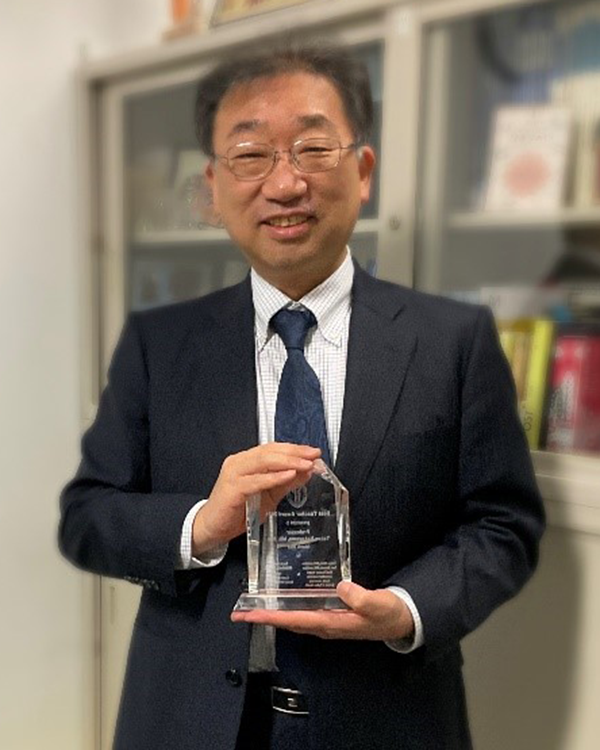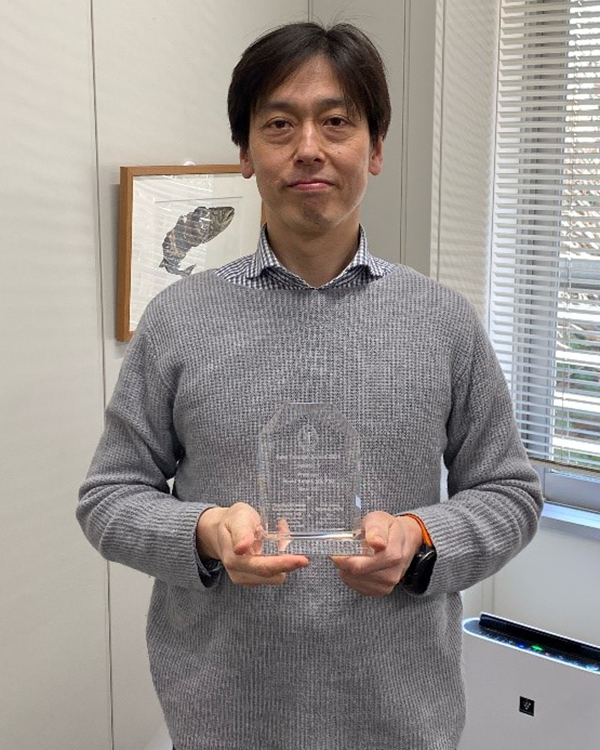Best Teacher Award 2021 and Best Coursework Award 2021
We are pleased to report the winners of the Best Teacher Award 2021, announced at the New Student Welcome (online, April 15, 2022), along with photos from the trophy presentation.
We are also pleased to announce the results of the Best Coursework Award 2021, which is given to honor lectures that have demonstrated high quality teaching.
【Best Teacher Award 2021】
The Best Teacher Award 2021 went to Professor Takeo Nakayama in the Department of Health Informatics and Professor Naoki Kondo in the Department of Social Epidemiology as a result of voting.
Congratulations on winning the award.
Takeo Nakayama, MD, PhD, Professor of Health Informatics

【Subjects taught】
Epidemiology I
Critical appraisal
Introduction to health science research
Health Informatics I
EBM & Clinical practice guidelines
【Emphases in class】
I try to refer to historical episodes and my experiences that are related with the text knowledge.
【Messages to the students】
Do our current best, with hoping better tomorrow!
Naoki Kondo, MD, PhD, Professor of Social Epidemiology

【Subjects taught】
Socio-epidemiology, Methods in social epidemiology, Public health intervention strategies
【Emphases in class】
I tried to make the lecture interactive by including group work to encourage discussion on problem-solving. I tried to ask as many fundamental “questions” as possible to the participants, and to encourage them to confront questions that have no answers.
【Messages to the students】
I tried to make the lecture interactive by including group work to encourage discussion on problem-solving. I tried to ask as many fundamental “questions” as possible to the participants, and to encourage them to confront questions that have no answers.
【Best Coursework Award 2021】
The Best Coursework Award 2021 went to “Health Informatics II” and “Intermediate Biostatistics” as a result of voting.
Congratulations on winning the award.
Health Informatics II
【Instructor】
Yoshimitsu Takahashi (Associate Professor of Health Informatics), Hiroshi Okada (Program-Specific Senior Lecturer of Health Informatics), Yoshitaka Nishikawa (Assistant Professor of Health Informatics)
【Outline and Purpose of the Course】(From FY2021 Syllabi)
・Participants will learn about elementary knowledge of the Internet and e-health, and ICT in healthcare will be introduced. Participants will learn about secondary data analysis and medical big data in Japan.
・Community pharmacies in developed countries are playing an important role not only in supplying medicines but also in public health in communities. In this lecture, it will be introduced the results of some intervention studies in community pharmacies for patients with NCDs. It also will be introduced Nudge and the patient approach on health behavioral theory which was used in the Japanese intervention studies.
・Disaster and health informatics: Participants will learn about health outcomes following a disaster and discuss necessary health information during and after the disaster. Participants will also learn about health on disaster risk reduction. The course will provide the knowledge and skills to write case studies d case reports.
Intermediate Biostatistics
【Instructors】
Masaaki Doi (Associate Professor of Biostatistics), Tosiya Sato (Professor of Biostatistics), Masatomo Omiya (Program-Specific Assistant Professor of Biostatistics), Kazuhiko Mori (Japan Pharmaceutical Manufacturers Association)
【Outline and Purpose of the Course】(From FY2021 Syllabi)
Confounding leads to bias which interferes causal interpretation between exposure and outcome in observational studies.
This course is designed to provide statistical methods for adjustment of confounding. Stratified analysis and regression modeling are introduced. Related topics, such as survival analysis, missing data, etc., are included. For conducting an epidemiologic or clinical research, developing a study protocol and a statistical analysis plan is necessary. We provide an essence for developing them.